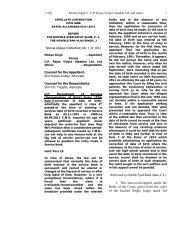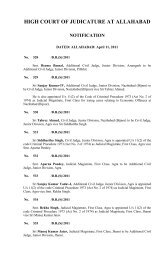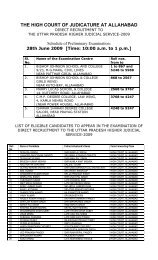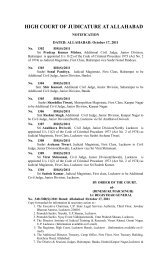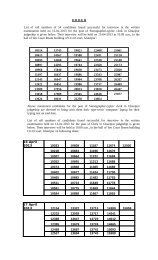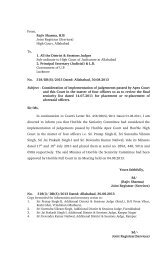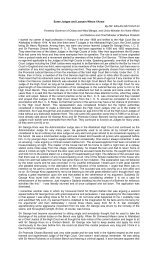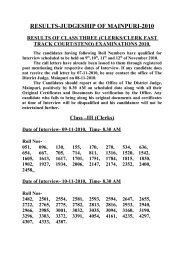Apr - High Court of Judicature at Allahabad
Apr - High Court of Judicature at Allahabad
Apr - High Court of Judicature at Allahabad
Create successful ePaper yourself
Turn your PDF publications into a flip-book with our unique Google optimized e-Paper software.
1 All Dev Sharan Yadav V. St<strong>at</strong>e <strong>of</strong> U.P. 455<br />
the applicant under the instruction d<strong>at</strong>ed<br />
21.02.2007 given by the St<strong>at</strong>e<br />
Government. Learned Magistr<strong>at</strong>e<br />
considered the applic<strong>at</strong>ion and arrived <strong>at</strong><br />
the conclusion th<strong>at</strong> the charge against<br />
the applicant was <strong>of</strong> serious in n<strong>at</strong>ure,<br />
therefore, it was not proper in public<br />
interest to permit withdrawal from<br />
prosecution. Accordingly, the learned<br />
Magistr<strong>at</strong>e rejected the applic<strong>at</strong>ion vide<br />
his order d<strong>at</strong>ed 14.12.2007.<br />
5. The learned counsel for the<br />
applicant submitted th<strong>at</strong> the applicant is<br />
an old person aged about 63 years who<br />
has deposited the entire amount<br />
involved in the present case in the<br />
Government treasury. More so he has no<br />
criminal antecedent, therefore, no useful<br />
purpose would be served to try the<br />
applicant, therefore, it was desirable on<br />
the part <strong>of</strong> the learned Magistr<strong>at</strong>e to<br />
allow the applic<strong>at</strong>ion for withdrawal<br />
from the prosecution. It was next<br />
submitted th<strong>at</strong> the applic<strong>at</strong>ion for<br />
withdrawal from the prosecution could<br />
be moved on the instruction <strong>of</strong> the St<strong>at</strong>e<br />
Government because the Uttar Pradesh<br />
Act No. 18 <strong>of</strong> 1991 has amended section<br />
321 <strong>of</strong> the Code <strong>of</strong> Criminal Procedure<br />
with effect from 16.02.1991 which<br />
provides th<strong>at</strong> the applic<strong>at</strong>ion for<br />
withdrawal from the prosecution can be<br />
moved by the Public Prosecutor or the<br />
Assistant Public Prosecutor in-charge <strong>of</strong><br />
the case on the written permission <strong>of</strong> the<br />
St<strong>at</strong>e Government which shall be filed<br />
in the court.<br />
6. Learned counsel for the<br />
applicant further submitted th<strong>at</strong> in view<br />
<strong>of</strong> the Apex <strong>Court</strong> verdict in the case <strong>of</strong><br />
Rajender Kumar Jain Vs. St<strong>at</strong>e (1980)<br />
3 SCC 435, the ultim<strong>at</strong>e discretion to<br />
withdraw from prosecution was <strong>of</strong> the<br />
Assistant Prosecuting Officer in-charge<br />
<strong>of</strong> the case and the court's jurisdiction<br />
was merely supervisory in n<strong>at</strong>ure,<br />
therefore, wh<strong>at</strong> was open to the court<br />
was to see whether the Public<br />
Prosecutor acted with independent mind<br />
in the broader interest <strong>of</strong> public justice,<br />
therefore, according to th<strong>at</strong> verdict the<br />
court is required to see the broader<br />
interest <strong>of</strong> public justice, public order<br />
and peace while considering an<br />
applic<strong>at</strong>ion under section 321 <strong>of</strong> the<br />
Code <strong>of</strong> Criminal Procedure. It was<br />
further held in th<strong>at</strong> case th<strong>at</strong> the court's<br />
duty is not to reappreci<strong>at</strong>e the grounds<br />
which led the Public Prosecutor to<br />
request withdrawal from the<br />
prosecution but to consider whether the<br />
Public Prosecutor applied his mind as a<br />
free agent, uninfluenced by irrelevant<br />
and extraneous consider<strong>at</strong>ions. The<br />
court has a special duty in this regard<br />
as it is the ultim<strong>at</strong>e repository <strong>of</strong><br />
legisl<strong>at</strong>ive confidence in granting or<br />
withholding its consent to withdrawal<br />
from the prosecution. In the case <strong>of</strong><br />
St<strong>at</strong>e <strong>of</strong> Orissa Vs. Chandrika<br />
Mohap<strong>at</strong>ra and others (1976) 4 SCC<br />
250 , the Apex <strong>Court</strong> propounded the<br />
principles th<strong>at</strong> the ultim<strong>at</strong>e guiding<br />
consider<strong>at</strong>ion must always be the<br />
interest <strong>of</strong> administr<strong>at</strong>ion <strong>of</strong> justice and<br />
th<strong>at</strong> is touch stone on which the<br />
question must be determined. However,<br />
the Apex <strong>Court</strong> further opined th<strong>at</strong> no<br />
hard and fast rule can be laid down nor<br />
can any c<strong>at</strong>egories <strong>of</strong> cases be defined<br />
in which consent should be granted or<br />
refused. It must ultim<strong>at</strong>ely depend on<br />
the facts and circumstances <strong>of</strong> each case<br />
in the light <strong>of</strong> wh<strong>at</strong> is necessary in order<br />
to promote the ends <strong>of</strong> justice, because<br />
the objective <strong>of</strong> every judicial process<br />
must be the <strong>at</strong>tainment <strong>of</strong> justice.




